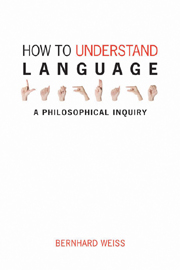Book contents
- Frontmatter
- Contents
- Preface
- 1 The puzzles of language
- 2 The starting-point for analysis
- 3 Analysing sentence-meaning
- 4 Analysing synonymy
- 5 Radical translation
- 6 The structure of a theory of meaning
- 7 Radical interpretation
- 8 Linguistic norms, communication and radical interpretation
- 9 Linguistic normativity
- 10 Radical or robust?
- 11 Language and community
- 12 Rules and privacy: the problem
- 13 Rules and privacy: the solution?
- 14 Truth-conditions versus use-conditions
- Notes
- Bibliography
- Index
14 - Truth-conditions versus use-conditions
- Frontmatter
- Contents
- Preface
- 1 The puzzles of language
- 2 The starting-point for analysis
- 3 Analysing sentence-meaning
- 4 Analysing synonymy
- 5 Radical translation
- 6 The structure of a theory of meaning
- 7 Radical interpretation
- 8 Linguistic norms, communication and radical interpretation
- 9 Linguistic normativity
- 10 Radical or robust?
- 11 Language and community
- 12 Rules and privacy: the problem
- 13 Rules and privacy: the solution?
- 14 Truth-conditions versus use-conditions
- Notes
- Bibliography
- Index
Summary
Thus far we have argued that we should pursue the philosophy of language by attempting to construct a theory of meaning for a natural language. We have rejected radical interpretation as the stance to adopt in constructing such a theory and have instead recommended a modified robust approach. According to the latter, we shall be aiming to provide an informative account of the meanings of expressions in our own language. In other words, we are attempting to make the workings of our own language perspicuous to ourselves. Because we are constructing the account against the backdrop of our own facility with our language, the account will not explain the workings of our language from a completely external point of view. One consequence of limiting our explanatory ambitions in this way is that we need not do any work to exclude sceptical possibilities; these are excluded by our context of theorizing rather than by anything explicit in the theory itself.
In this last chapter I want to turn to the question of the form of the theory of meaning. The only theory that we have looked at in any detail is the truth-conditional theory advocated by Davidson (among others). We shall first consider attacks on truth-conditional theories of meaning and then go on to sketch possible alternatives.
Dummett's attack on truth-conditional theories
Dummett gives three related arguments against truth-conditional accounts of meaning: one focuses on the social role of language; one on knowledge of meaning; and one on acquisition of language. The arguments are distinct but each develops an aspect of the publicity of meaning, which is the fundamental idea motivating each argument. We shall turn to the arguments in a moment, but first we should draw out some features of the truth-conditional account of meaning.
- Type
- Chapter
- Information
- How to Understand LanguageA Philosophical Inquiry, pp. 231 - 250Publisher: Acumen PublishingPrint publication year: 2009



